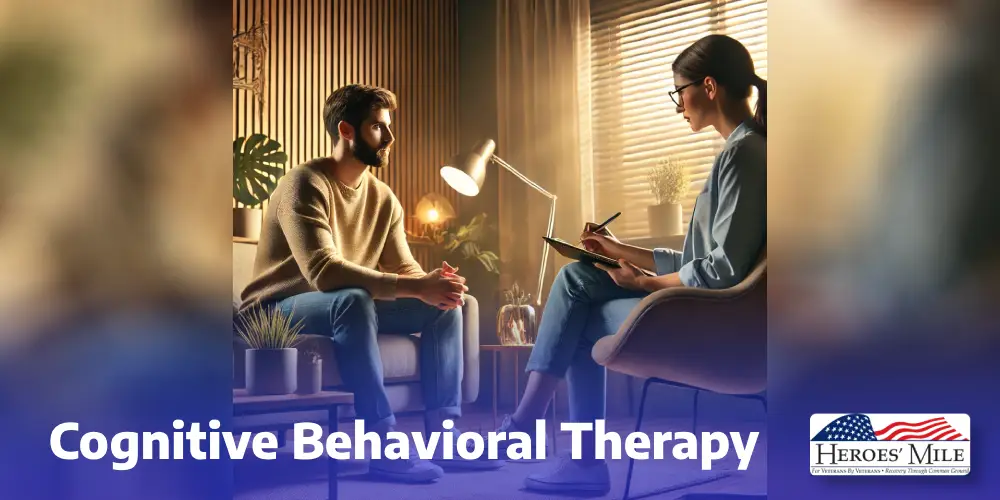Cognitive Behavioral Therapy
Did you know that there is an evidence-based treatment option that can help individuals deal with substance abuse issues and post-traumatic stress disorder (PTSD)? Cognitive behavioral therapy (CBT) uses innovative therapeutic techniques to help individuals regain control of their mental health.

What Is CBT?
Cognitive behavioral therapy is a type of talk therapy. Rather than traditional talk therapy, which focuses on discussing past events and discussing their impact on the patient, CBT works a little differently.
Your mental health professional will help you replace negative self-talk with positive, more constructive alternatives. When you correct these underlying beliefs, you make it easier to take control of your life. But what kind of help will you get, exactly?
Common CBT activities include:
- Developing strategies to help manage your emotions
- Teaching appropriate coping mechanisms for difficult situations
- Showing you how to cope with grief and loss
- Showing you how to manage addiction symptoms
- Assisting in managing your mental illness symptoms
- Teaching you about healthy relationships and communication
- Working to resolve issues stemming from service-related trauma
This is a good overview of CBT, but what exactly makes it different from traditional talk therapy? And how does that difference help you?
CBT vs. Traditional Talk Therapy
In the talk therapy you’ve seen in movies, discussions focus on the events themselves. For example, a therapist might ask you to describe what happened during your service that led to trauma. However, in CBT, the focus is less on the event and more on how it has affected you. You may be encouraged to explore how you feel discussing the event. This is how negative beliefs are identified through this therapeutic technique.
For example, many veterans living with PTSD have thoughts like “I don’t deserve help” or “I can’t be saved.” These kinds of negative beliefs can hinder your ability to lead a healthy lifestyle, and they’re the primary focus of CBT treatments.
Continuous negative automatic thoughts can keep you stuck in old thought patterns. Instead of opening yourself up to new ideas, you turn away from them. If you think, “I’m not smart enough to get that job,” you could easily talk yourself into doing poorly in an interview, despite having the potential to do very well. Thoughts like these can become fixed after years of not being addressed, and they can infiltrate nearly every area of your life.
CBT sessions also seek to change cognitive distortions, which are negative thought processes and biased ways of thinking about yourself or the world. If you suffer from a substance use disorder, these cognitive distortions could fuel your addiction issues. Additionally, they can lead to worsened relationships and feelings of depression or anxiety.
CBT helps you become aware of your cognitive distortions so you can work towards shifting to a more rational and realistic way of thinking. When your thoughts become more logical, they can lead to a more positive outlook on life, and they can lead to healthier emotional and behavioral responses to life’s challenges.
CBT Can Help Veterans and Non-Veterans
Individuals face unique challenges, both in mental health and addiction recovery. CBT is a proven tool to help veterans and non-veterans heal from these issues and move on with their lives.
Do you have questions about how we help individuals at our addiction treatment center in DeLand, Florida? Call 888-838-6692 or send your questions online through our contact form.
FAQ
- What is Cognitive Behavioral Therapy (CBT)?
CBT is a type of psychotherapy that helps individuals identify and change negative thought patterns to improve emotional regulation and develop healthier coping mechanisms. - What conditions can CBT treat?
CBT is effective for anxiety, depression, PTSD, OCD, phobias, and other mental health disorders. - How long does CBT treatment typically last?
Most CBT treatments last between 6 to 20 sessions, depending on the individual’s needs and progress. - Is CBT suitable for all ages?
Yes, CBT can be adapted to help individuals with anxiety, depression, and behavioral problems. - What can I expect during a CBT session?
During a session, the therapist will work with the patient to identify negative thoughts, challenge those thoughts, and replace them with more positive, realistic ones.
